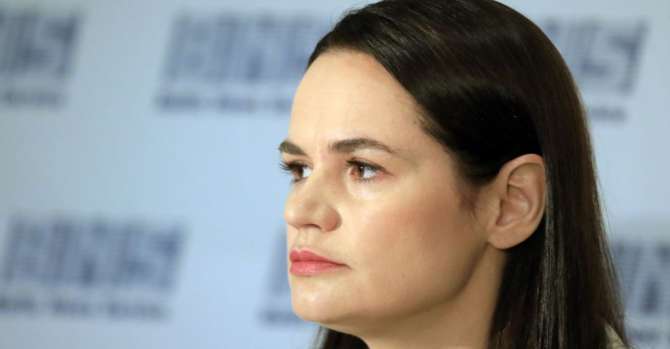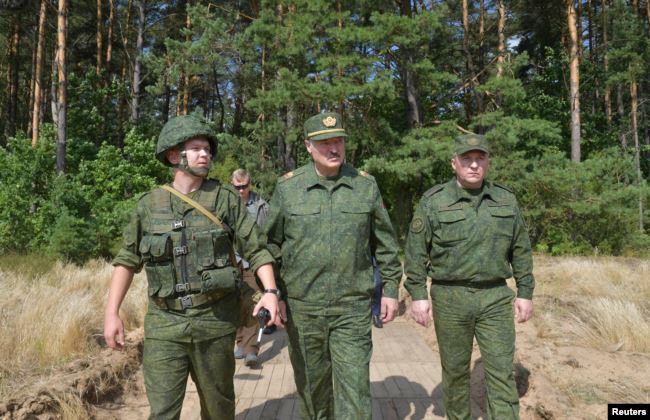Belarus Opposition Leader To Meet Leading U.S. Diplomat In Lithuania
Rferl
22 August 2020, 18:44
 Belarusia opposition leader Svyatlana Tsikhanouskaya will meet on August 24 with U.S. Deputy Secretary of State Stephen Biegun in a sign of U.S. participation in seeking a peaceful resolution to a disputed presidential election in Belarus.
Belarusia opposition leader Svyatlana Tsikhanouskaya will meet on August 24 with U.S. Deputy Secretary of State Stephen Biegun in a sign of U.S. participation in seeking a peaceful resolution to a disputed presidential election in Belarus.
Tsikhanouskaya's team said on August 22 that the No. 2 U.S. diplomat would meet Tsikhanouskaya in Lithuania.
Biegun also will meet Lithuania's defense and foreign ministers to discuss the situation in Belarus and bilateral and defense matters, Lithuania's Foreign Ministry said. Biegun will travel on to Russia later in the week.
Russian Deputy Foreign Minister Sergei Ryabkov told Interfax on August 22 that talks in Moscow would go beyond the subject of Belarus.
"In addition, we're meaning to have an in-depth discussion with him of all things related to Russian-U.S. relations in various aspects," Ryabkov said.
![Belarus Opposition Leader To Meet Leading U.S. Diplomat In Lithuania]()
Earlier on August 22,Belarusian President Alyaksandr Lukashenka ordered his defense minister and westernmost military forces to adopt "the most stringent measures" to protect the country's borders in the face of what he suggested was a foreign-backed plan for a "color revolution" in the post-Soviet country of around 9 million people.
His appearance on August 22, in fatigues at a military training ground near Hrodno, was the latest public indication that the embattled five-term president intends to weather unprecedented street protests urging him to step down after a disputed presidential election two weeks ago.
"Everything is clear," Lukashenka was quoted as saying to state-run Belta news agency. "As we expected, everything is going according to a plan for a color revolution with the agitation of the internal political situation in the country."
Demonstrations and strikes have erupted across Belarus to protest what critics call a rigged election in which Lukashenka claimed a landslide reelection victory that would give him a sixth term in office.
Thousands of people have been arrested and reports of torture and disappearances have increased, but exiled opposition presidential candidate Svyatlana Tsikhanouskaya and hundreds of thousands of demonstrators and have vowed they won't accept a continuation of Lukashenka's 26-year rule.
Further protests are expected this weekend.
Meanwhile Tsikhanouskaya, a 37-year-old political novice who entered the race after her husband was jailed shortly after announcing his planned candidacy, told Reuters on August 22 that Lukashenka would have to leave sooner or later.
She said the Belarusian public would not allow him to treat them as before.
Tsikhanouskaya said she had received calls from international leaders, including the United Kingdom and Germany, and had asked only that they support the Belarusian public and respect Belarusian sovereignty.
Asked by Reuters about Belarus's powerful neighbor to the east, she said she had no reason to contact Russian President Vladimir Putin but would similarly hope that Moscow respects Belarusian sovereignty.
Tsikhanouskaya, who has offered to serve a transitional role and help de-escalate the situation, said she hoped to return to Belarus at some point but that she currently felt safe in Lithuania.
The European Union has said it does not recognize the August 9 presidential vote because of irregularities that ended up giving the strongman just over 80 percent of the ballot, and the United States has expressed support for an independent international examinations of “electoral irregularities” there.
Lukashenka blamed foreign meddling for the unrest and cited an unconfirmed "movement of NATO troops to the borders."
Lukashenka suggested the domestic political strains were orchestrated to distract attention from a mounting military threat from the west.
Belarus shares its western border with Latvia, Lithuania, Poland, and Ukraine.
The Belta report said he tasked Defense Minister Viktar Khrenin and the country's Western Operational Command "with the adoption of the most stringent measures to protect the territorial integrity of our country."
"We see that NATO troops are seriously stirring in the immediate vicinity of our borders on the territory of Poland and Lithuania," Russian TASS quoted Lukashenka as saying.
He presented no evidence of NATO troop movements in the region.
Lukashenka is facing the most widespread public challenge to his hold on power since the former Soviet director of a collective farm took over as president in 1994.
Tsikhanouskaya said on August 21 that she had filed an official complaint against the announced results, saying her compatriots "will never accept" Lukashenka's continued rule.
"It should be clear to the president that there is a need for change," Tsikhanouskaya said at her first press conference, on August 21, since fleeing to Lithuania last week amid fears of arrest. "I hope that good sense prevails and the people will be heard and there will be new elections."
Tsikhanouskaya said from Lithuania on August 21 that she had filed an official complaint against the announced results, saying her compatriots "will never accept" Lukashenka's continued rule.
"It should be clear to the president that there is a need for change," Tsikhanouskaya, a 37-year-old political novice who entered the race after her husband was jailed shortly after announcing his planned candidacy, said at her first press conference since fleeing to Lithuania last week amid fears of arrest. "I hope that good sense prevails and the people will be heard and there will be new elections."
Official results gave Tsikhanouskaya about 10 percent of the vote, but she claims to have actually received between 60 and 70 percent.
Belarusian prosecutors said on August 20 that they had opened a criminal investigation into national-security-related charges against the founders of an opposition council set up to negotiate the transition of power amid the huge protests.
The council members have rejected the accusations and insisted that their actions have been in full conformity with Belarusian law.
Belarusian authorities have also blocked access to dozens of websites and proxy VPN services, and persecuted and in some cases expelled journalists.
22 August 2020, 18:44

Belarusian opposition leader Svyatlana Tsikhanouskaya
Tsikhanouskaya's team said on August 22 that the No. 2 U.S. diplomat would meet Tsikhanouskaya in Lithuania.
Biegun also will meet Lithuania's defense and foreign ministers to discuss the situation in Belarus and bilateral and defense matters, Lithuania's Foreign Ministry said. Biegun will travel on to Russia later in the week.
Russian Deputy Foreign Minister Sergei Ryabkov told Interfax on August 22 that talks in Moscow would go beyond the subject of Belarus.
"In addition, we're meaning to have an in-depth discussion with him of all things related to Russian-U.S. relations in various aspects," Ryabkov said.

Belarusian President Aleyaksandr Lukashenka (center) visits a military firing range near Hrodno on August 22.
Earlier on August 22,Belarusian President Alyaksandr Lukashenka ordered his defense minister and westernmost military forces to adopt "the most stringent measures" to protect the country's borders in the face of what he suggested was a foreign-backed plan for a "color revolution" in the post-Soviet country of around 9 million people.
His appearance on August 22, in fatigues at a military training ground near Hrodno, was the latest public indication that the embattled five-term president intends to weather unprecedented street protests urging him to step down after a disputed presidential election two weeks ago.
"Everything is clear," Lukashenka was quoted as saying to state-run Belta news agency. "As we expected, everything is going according to a plan for a color revolution with the agitation of the internal political situation in the country."
Demonstrations and strikes have erupted across Belarus to protest what critics call a rigged election in which Lukashenka claimed a landslide reelection victory that would give him a sixth term in office.
Thousands of people have been arrested and reports of torture and disappearances have increased, but exiled opposition presidential candidate Svyatlana Tsikhanouskaya and hundreds of thousands of demonstrators and have vowed they won't accept a continuation of Lukashenka's 26-year rule.
Further protests are expected this weekend.
Meanwhile Tsikhanouskaya, a 37-year-old political novice who entered the race after her husband was jailed shortly after announcing his planned candidacy, told Reuters on August 22 that Lukashenka would have to leave sooner or later.
She said the Belarusian public would not allow him to treat them as before.
Tsikhanouskaya said she had received calls from international leaders, including the United Kingdom and Germany, and had asked only that they support the Belarusian public and respect Belarusian sovereignty.
Asked by Reuters about Belarus's powerful neighbor to the east, she said she had no reason to contact Russian President Vladimir Putin but would similarly hope that Moscow respects Belarusian sovereignty.
Tsikhanouskaya, who has offered to serve a transitional role and help de-escalate the situation, said she hoped to return to Belarus at some point but that she currently felt safe in Lithuania.
The European Union has said it does not recognize the August 9 presidential vote because of irregularities that ended up giving the strongman just over 80 percent of the ballot, and the United States has expressed support for an independent international examinations of “electoral irregularities” there.
Lukashenka blamed foreign meddling for the unrest and cited an unconfirmed "movement of NATO troops to the borders."
Lukashenka suggested the domestic political strains were orchestrated to distract attention from a mounting military threat from the west.
Belarus shares its western border with Latvia, Lithuania, Poland, and Ukraine.
The Belta report said he tasked Defense Minister Viktar Khrenin and the country's Western Operational Command "with the adoption of the most stringent measures to protect the territorial integrity of our country."
"We see that NATO troops are seriously stirring in the immediate vicinity of our borders on the territory of Poland and Lithuania," Russian TASS quoted Lukashenka as saying.
He presented no evidence of NATO troop movements in the region.
Lukashenka is facing the most widespread public challenge to his hold on power since the former Soviet director of a collective farm took over as president in 1994.
Tsikhanouskaya said on August 21 that she had filed an official complaint against the announced results, saying her compatriots "will never accept" Lukashenka's continued rule.
"It should be clear to the president that there is a need for change," Tsikhanouskaya said at her first press conference, on August 21, since fleeing to Lithuania last week amid fears of arrest. "I hope that good sense prevails and the people will be heard and there will be new elections."
Tsikhanouskaya said from Lithuania on August 21 that she had filed an official complaint against the announced results, saying her compatriots "will never accept" Lukashenka's continued rule.
"It should be clear to the president that there is a need for change," Tsikhanouskaya, a 37-year-old political novice who entered the race after her husband was jailed shortly after announcing his planned candidacy, said at her first press conference since fleeing to Lithuania last week amid fears of arrest. "I hope that good sense prevails and the people will be heard and there will be new elections."
Official results gave Tsikhanouskaya about 10 percent of the vote, but she claims to have actually received between 60 and 70 percent.
Belarusian prosecutors said on August 20 that they had opened a criminal investigation into national-security-related charges against the founders of an opposition council set up to negotiate the transition of power amid the huge protests.
The council members have rejected the accusations and insisted that their actions have been in full conformity with Belarusian law.
Belarusian authorities have also blocked access to dozens of websites and proxy VPN services, and persecuted and in some cases expelled journalists.

